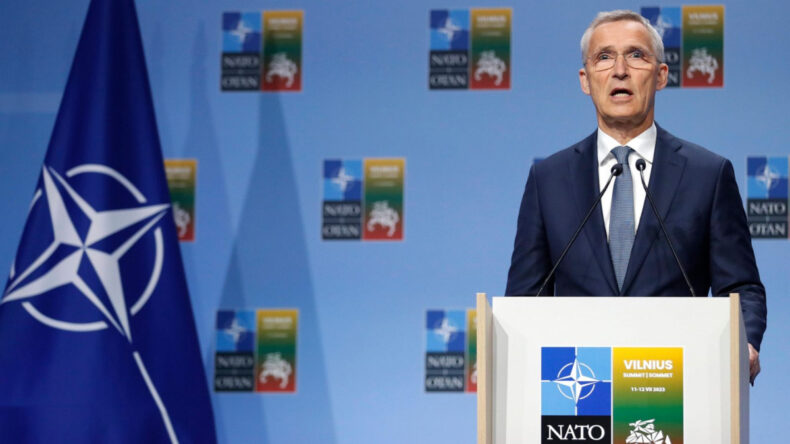NATO Summit Delivers Positive Signal for Ukraine’s Membership Bid Amidst Russian Tensions
In a pivotal gathering of NATO leaders in Vilnius, Ukraine’s bid for membership received a “positive and strong message” from Secretary General Jens Stoltenberg. The summit aimed to address the far-reaching consequences of Russia’s invasion of Ukraine, which brought the spectre of war to Europe’s doorstep.
Table of Contents
Despite divisions among NATO’s 31 member states, an outright invitation for Ukraine to join was not on the table. Moscow, Ukraine’s former Soviet overlord, argued that such a move would threaten its national security. Stoltenberg reassured Kyiv that it would receive increased military aid, relaxed membership conditions, and a new framework for cooperation through the NATO-Ukraine Council.
“We are confident that the message conveyed on Ukraine and its path toward membership will be resoundingly positive,” Stoltenberg declared ahead of the summit held in Lithuania’s capital.
U.S. National Security Adviser Jake Sullivan echoed Stoltenberg’s sentiment, emphasizing that the gathering would send a “positive signal” regarding Ukraine’s membership aspirations. Diplomats expressed optimism as negotiators neared a final agreement.
During a joint appearance with Lithuanian President Gitanas Nauseda, U.S. President Joe Biden reaffirmed America’s unwavering commitment to the alliance. “Our pledge to stand by you remains steadfast,” he affirmed.
One of the key outcomes of the summit is the approval of NATO’s first comprehensive defence plans since the end of the Cold War, designed to safeguard member countries against potential aggression from Russia.
While NATO members concur that Ukraine cannot join the alliance while the war persists, disagreements have arisen regarding the timeline and conditions for its eventual membership. Ukrainian President Volodymyr Zelenskiy, slated to attend the Vilnius gathering, has persistently urged NATO to establish a clear pathway for Ukraine’s accession once the conflict concludes. Zelenskiy highlighted the role of Ukrainian troops in curbing Russian aggression and protecting Europe.
“The eastern border of Ukraine, along with the positions of our warriors, serves as an unyielding line that the Russian dictatorship will never cross again,” Zelenskiy proclaimed on Twitter.
Meanwhile, Moscow expressed its criticism of the two-day summit. A senior Russian diplomat based in Vienna, quoted by Russia’s state RIA news agency, warned that Europe would face “catastrophic consequences” should the conflict in Ukraine escalate.
As the NATO summit concluded, it became evident that while challenges and differences persisted among member states, a positive trajectory had been set for Ukraine’s prospective membership, assuring Kyiv of Western support amidst heightened tensions with Russia.
Sweden Nears Accession as Tensions with Russia Persist
As NATO members gather in Vilnius, Ukraine’s aspirations for NATO membership receive support from Eastern European allies who argue that it is crucial to deter further Russian aggression. However, countries like the United States and Germany exercise caution, concerned about the potential of escalating conflicts and the risk of a global war.
Established in 1949 to counter the threat of a Soviet attack on allied nations, NATO grapples with the question of Ukraine’s integration into its collective security framework. The NATO-Ukraine Council, scheduled to convene its inaugural session on Wednesday, resembles a coordination platform similar to the one NATO had with Russia until 2014. The annexation of Crimea by Moscow and its subsequent support for rebel forces in eastern Ukraine led to the suspension of this cooperation.
Secretary General Jens Stoltenberg announces a significant development by stating that Ukraine can bypass the Membership Action Plan (MAP), which outlines the steps for fulfilling political, economic, and military requirements before attaining NATO membership.
Lithuania’s NATO ambassador reveals that the summit will commit 500 million euros annually in non-lethal aid to Ukraine, including medical supplies and demining efforts. Norway also pledged increased military assistance to Kyiv. Foreign Minister Anniken Huitfeldt emphasizes the importance of Ukraine’s success for collective security.
While Ukraine’s membership is likely to face further delays, another country makes progress on its path to NATO. Turkish President Tayyip Erdogan has agreed to submit Sweden’s bid for ratification to the Turkish parliament, signalling a resolution to months of opposition that strained the bloc.
Russia’s invasion of Ukraine in 2022 prompted Sweden and Finland to abandon their long-standing military non-alignment and seek NATO membership. Finland became NATO’s 31st member in April, but Sweden’s accession has been hindered by a dispute with Turkey. Erdogan accused Sweden of inadequate efforts to combat groups Ankara perceives as terrorists.
Swedish Prime Minister Ulf Kristersson and Erdogan have reached an agreement to enhance counterterrorism cooperation. The United States has pledged to proceed with the transfer of F-16 fighter jets to Turkey. President Joe Biden expresses no surprise at Turkey’s decision to lift its veto.
Meanwhile, Ukraine’s military reports drone attacks by Russia on the southern port of Odesa and the capital city, Kyiv, in the early hours of Tuesday.
As tensions persist with Russia, Ukraine’s path to NATO membership advances, albeit with unavoidable delays, while Sweden makes headway in its accession process. The outcome of the NATO summit underscores the ongoing challenges faced by the alliance in navigating geopolitical complexities and ensuring regional security.













